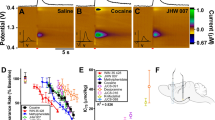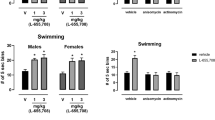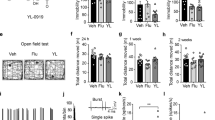Abstract
Lithium is a unique drug with therapeutic as well as prophylactic value for both manic and depressive phases of manic-depressive illness,1,2. The precise mechanisms of its clinical efficacy remain unknown, but there are two main theories of its biochemical action. One proposes that lithium inhibits adrenergically activated adenylate cyclase function3–5 whereas the other suggests that it inhibits phosphatidyl inositol turnover, which is known to be activated by cholinergic agonists6–8. Neither mechanism alone, however, can explain both the antimanic and antidepressant effects of lithium. Because of the pivotal role of G proteins in post-receptor information transduction, we have investigated the interaction of lithium with G protein function. Lithium at therapeutically efficacious concentrations completely blocked both adrenergic and cholinergic agonist-induced increases in [3H]GTP binding to membranes from rat cerebral cortex, in both in vitro and ex vivo experiments. The same lithium treatments also abolished guanine nucleotide modulation of agonist binding. Our findings suggest G proteins (Gs and Gj or G0) as the molecular site of action for both the antimanic and antidepressant effects of lithium.
This is a preview of subscription content, access via your institution
Access options
Subscribe to this journal
Receive 51 print issues and online access
$199.00 per year
only $3.90 per issue
Buy this article
- Purchase on Springer Link
- Instant access to full article PDF
Prices may be subject to local taxes which are calculated during checkout
Similar content being viewed by others
References
Schou, M. & Thomsen, K. in Lithium Research and Therapy (ed. Johnson, F. N.) 63–84 (Academic, New York, 1975).
Schildkraut, J. in Lithium, Its Role in Psychiatric Research and Treatment (eds Gershon, S. & Shopsin, B.) 51–53 (Plenum, New York, 1973).
Forn, J. in Lithium Research and Therapy (ed. Johnson, F. N.) 487–497 (Academic, New York, 1975).
Ebstein, R., Belmaker, R. H., Grunhaus, L. & Rimon, R. Nature 259, 411–413 (1976).
Belmaker, R. H. BioL Psychiat. 16, 333–349 (1981).
Hallcher, L. M. & Sherman, W. R. J. biol. Chem. 255, 10896–10901 (1980).
Berridge, M. J., Downes, C. P. & Hanley, M. R. Biochem. J. 206, 587–595 (1982).
Allison, J. H., Blisner, M. E., Holland, W. H., Hipps, P. P. & Sherman, W. R. Biochem. biophys. Res. Commun. 71, 664–669 (1987).
Cassel, D. & Selinger, Z. Proc. natn. Acad. Sci U.S.A 75, 4155–4159 (1978).
Murayama, T. E. & Ui, M. J. biol. Chem. 259, 761–769 (1984).
Stemweis, P. C. & Robishaw, J. D. J. biol. Chem. 259, 13806–13813 (1984).
Fergusson, K. M., Higashijima, T., Smigel, M. D. & Gilman, A. G. J. biol. Chem. 261, 7393–7399 (1986).
Northup, J. K., Smigel, M. D. & Gilman, A. G. J. biol Chem. 257, 11416–11423 (1982).
Kurose, H., Katada, T., Haya, T., Ichiyama, A. E. & Ui, M. J. biol. Chem. 261, 6423–6428 (1986).
Gilman, A. G. A. Rev. Biochem. 56, 615–649 (1987).
Stemweis, P. C., Northup, J. K., Smigel, M. D. & Gilman, A. G. J. biol. Chem. 256, 11517–11526 (1981).
Ross, E. M., Howlett, A. C., Ferguson, K. M. & Gilman, A. G. J. biol Chem. 253, 6401–6412 (1978).
Florio, V. & Stemweis, P. C. J. biol. Chem. 260, 3477–3483 (1985).
Berrie, C. P., Birdsall, N. J. M., Burgen, A. S. V. & Hulme, E. C. Biochem. biophys. Res. Commun. 87, 1000–1006 (1979).
Ehlert, F. J., Roeske, W. R. & Yamamura, H. I. Fedn Proc. 40, 153–161 (1981).
Gurwitz, D., Kloog, Y. & Sokolovsky, M. Proc. natn. Acad. Sci. U.S.A. 81, 3650–3654 (1984).
Newman, M. E. & Belmaker, R. H. Neuropharmacology 26, 211–217 (1987).
Seamon, K. B. & Daly, J. W. Adv. Cyclic Nucleotide Res. 20, 1–150 (1986).
Batty, I. & Nahorski, R. J. Neurochem. 45, 1514–1521 (1985).
Casebolt, T. L. & Jope, R. S. Eur. J. Pharmac. 140, 245–246 (1987).
Abdel-Latif, A. A. Pharmac. Rev. 38, 227–272 (1986).
Cockcroft, S. & Gomperts, B. D. Nature 314, 534–536 (1985).
Litosch, I., Wallis, C. & Fzin, J. N. J. biol. Chem. 260, 5464–5471 (1985).
Janowsky, D. S., El-Yousef, M. K., Davis, J. M. & Sekerke, M. J. Lancet II, 632–635 (1972).
Author information
Authors and Affiliations
Rights and permissions
About this article
Cite this article
Avissar, S., Schreibert, G., Danon, A. et al. Lithium inhibits adrenergic and cholinergic increases in GTP binding in rat cortex. Nature 331, 440–442 (1988). https://doi.org/10.1038/331440a0
Received:
Accepted:
Issue Date:
DOI: https://doi.org/10.1038/331440a0
This article is cited by
-
Functional coupling of M1 muscarinic acetylcholine receptor to Gαq/11 in dorsolateral prefrontal cortex from patients with psychiatric disorders: a postmortem study
European Archives of Psychiatry and Clinical Neuroscience (2020)
-
The Pharmacogenomics of Bipolar Disorder study (PGBD): identification of genes for lithium response in a prospective sample
BMC Psychiatry (2016)
-
Biphasic Dose-Dependent Effect of Lithium Chloride on Survival of Human Hormone-Dependent Breast Cancer Cells (MCF-7)
Biological Trace Element Research (2012)
-
Affective disorders, antidepressant drugs and brain metabolism
Molecular Psychiatry (2003)
Comments
By submitting a comment you agree to abide by our Terms and Community Guidelines. If you find something abusive or that does not comply with our terms or guidelines please flag it as inappropriate.



